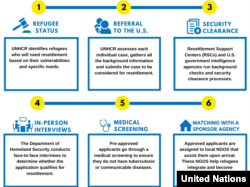Marta Havryliuk and her 13-year-old son, Ostap, were living in Busk, Lvivska oblast, when Russia invaded Ukraine.
"At first, there were doubts whether to go or not," Havryliuk told VOA via Skype from Warsaw. "But later, when (the bombings) were getting closer, it became scary. I was scared for my child," she said.
Havryliuk decided it was time to join her sister in the Midwestern U.S. state of Illinois.
She and Ostap got into their car and headed for Poland. They got within 7 kilometers of the border before gridlock forced them to abandon their car and walk.
"The line for the passport control was so cramped. We were pressed from all sides. It was scary. Then, a fight broke out. We were pushed out of the queue. We were pushed out three times and had to get back," she said. Her son became sick. "We spent almost 24 hours within these six or seven kilometers. It was terrifying. Ostap wanted to sleep very much; he was noxious, his face turned green. He was begging to sleep, but how would you sleep?"
When they reached the border, the processing went quickly. When they crossed into Poland, volunteers in Medyka gave them hot soup, tea, napkins and hygiene products, and helped them find their way to Warsaw.
But the mother and son were still a long way from her sister in Illinois.
Though President Joe Biden has said the U.S. should admit Ukrainian refugees, the refugee resettlement process can take three to five years.
"I will welcome the Ukrainian refugees. We should welcome them here with open arms if they need access," Biden said Friday.
Human rights advocates are pushing Biden officials to expedite the process to reunite refugees with relatives in the U.S. CNN was the first to report the administration is considering it.
During a White House briefing Tuesday, press secretary Jen Psaki said the administration is discussing the available options.
"There are conversations about helping Ukrainians coming to America. … Obviously, they currently could apply through the refugee process, but we're continuing to discuss what options may exist," she said.
Voice of America asked the State Department about an expedited process, but the federal agency did not confirm or deny the possibility.
State spokesperson Ned Price addressed the issue Monday during a news briefing.
"We have a (refugee) ceiling that is set every year. Within that ceiling, there are categories, including refugees from that part of the world. If there is a need for Ukrainian refugees to be resettled farther afield from neighboring countries, that is something that we will look at very closely."
Krish O'Mara Vignarajah, president and CEO of Lutheran Immigration and Refugee Service, told VOA that knowing refugee resettlement is a complicated, years-long process, human rights advocates have been calling for an expedited process for current applicants.
"They already have their paperwork submitted. We believe they should be allowed to travel to the U.S. and to complete the application process while they're here. There's certainly historical precedent for that and we certainly believe in this situation that it's critically important," Vignarajah said.
The U.S. immigration system includes a patchwork of complex laws for regulating the flow of refugees seeking to enter the United States. The U.S. manages a strict vetting process to determine who to accept for resettlement.
According to the United Nations, more than 3 million people have fled the war in Ukraine, most to neighboring countries.
The refugee process begins when the United Nations High Commissioner for Refugees officially deems who is a refugee after screening and assessing who will need resettlement based on their vulnerabilities and specific needs.
The U.N. then refers newly screened refugees to governments around the world, including the U.S., for relocation and resettlement.
In 2021, the Biden administration raised the 2022 refugee cap to 125,000. Yet actual admissions continue to lag, and the White House has acknowledged the "goal will be hard to hit" despite Biden's determination to rebuild the program and renew "America's commitment to protect the most vulnerable, and to stand as a beacon of liberty and refuge to the world."
Earlier Ukrainian immigrants
The Trump administration dramatically cut the U.S. refugee program, limiting the number of refugees from countries in the Middle East and Africa immersed in ethnic conflicts and war.
But at the same time, the number of Ukrainians resettling in the U.S. sharply increased. Since fiscal 2001, the U.S. has welcomed more than 50,000 refugees from Ukraine.
In the past, Ukrainian refugees entered the United States through a special program enacted in 1990, known as the Lautenberg Amendment. It mainly helped religious minorities from the former Soviet republics to relocate to the U.S. if they had immediate family members here. According to reports, the amendment was included again in the omnibus spending bill that Congress recently approved.
If applicants can prove religious persecution, then the program "essentially allows those who have family here to apply and to reunify in the U.S. For those who do not have a U.S. family tie, they still have access to the refugee resettlement system," Vignarajah said.
More than 1 million Americans claim Ukrainian ancestry, according to 2019 census estimates.
Other ways to travel to the U.S.
Meanwhile, Havryliuk's sister, Ulyana Vysochanska, helped her sister and her son apply for a U.S. tourist visa. Vysochanska is a green-card holder and has been living in the U.S. for seven years.
She helped them fill out the forms, paid consular fees and set an appointment for an interview at the U.S. Consulate in Warsaw.
But at the U.S. Consulate, Havryliuk and her son were denied the visas because they weren't tourists.
"Refusal is difficult to predict because to obtain a nonimmigrant visa, B1-B2, an applicant must prove that he has no immigration intentions," said Iryna Mazur, an immigration lawyer in Philadelphia, Pennsylvania.
She added, "Second, they must prove strong ties with the country of residence, with Ukraine. People fled Ukraine because of the war, so they can't prove that they will return to Ukraine after a trip to the United States."
Applicants also must make an appointment for an interview at a U.S. embassy or consulate. Two years of pandemic restrictions have created a backlog, and now the wait for appointments at U.S. embassies in Europe is months long.
The State Department told VOA via email that it is "prioritizing consular support to U.S. citizens and their immediate family members."
"Whenever an individual applies for a U.S. visa, a consular officer reviews the facts of the case and determines whether the applicant is eligible for that visa based on U.S. law. We have no changes to visa eligibility to announce at this time," the State spokesperson wrote.
Applying for political asylum is not an option for those fleeing Ukraine, said Svitlana Ugryn, an immigration lawyer in Chicago, Illinois.
"Only people who are persecuted by their government, their country, or a group of people in their country can apply for political asylum. This status does not apply in cases where the aggressor or persecutor is another country. The Afghans (for example) had a different situation. First, America was officially present; they hired people, thus endangering them. Second, the Taliban are still Afghans; the threat came from the same people, and Ukraine is now under attack from a foreign state," Ugryn told VOA.
Another option would be to obtain humanitarian parole, a special permission given to those hoping to enter the United States under emergency circumstances. Though it does not automatically lead to permanent residency, "parolees" can apply for legal status — either through the asylum process or other forms of sponsorship, if available — once they're in the U.S., but that can take up to a year or longer, lawyers said.
What has the US done so far?
On March 4, the U.S. Department of Homeland Security announced that it would grant Ukrainians temporary protection status (TPS) for those present in the country since March 1, ensuring they can remain in the country for 18 months after their visa or work permit expires.
Then, the U.S. Immigration and Customs Enforcement (ICE) temporarily halted deportations to Ukraine while also suspending deportations to Belarus, Georgia, Hungary, Moldova, Poland, Romania, Russia and Slovakia.







